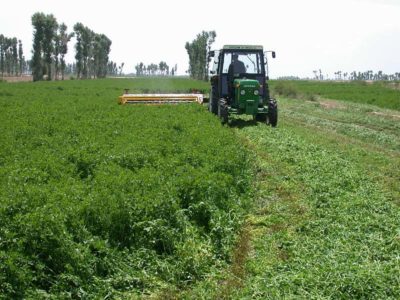A Washington state farmer who found unwanted genetically modified alfalfa on his land is speaking out, saying he wants to protect other farmers.
Joseph Peila, previously unidentified, is the man whose story previously was referenced in an Off The Grid News article. He is coming forward the same time as a legal petition was filed to force a federal government investigation into the matter.
“What happened on my farm shows that USDA is not looking out for farmers like me,” he said. “To start, (the Department of Agriculture) needs to find out how this contamination happened; then they must do everything in their power to stop it from happening again.”
The Center for Food Safety (CFS) filed the petition with the Department of Agriculture on behalf of Joseph and Michelle Peila. The conventional alfalfa grown on their farm was not accepted for export this year after testing confirmed the presence of Monsanto GMO alfalfa in the crop.
The petition demands that the US Department of Agriculture (USDA) thoroughly investigate how the genetically modified alfalfa wound up in the field and take necessary regulatory action based on the findings. The presence of genetically engineered crops in a field where none was planted appears to directly contradict the USDA’s official position on the possibility of GMO cross-contamination – “co-existene.”
Joseph Peila says he planted his alfalfa in fall of 2010, and GMO alfalfa was not approved by the government until January 2011.
The Center for Food Safety believes that the USDA’s views on co-existence between GMO seeds and conventional or organic crops is an “ill-advised sanctioning of transgenic contamination.”
New Survival Seed Bank™ Lets You Plant A Full Acre Crisis Garden!
“USDA has once again abandoned farmers victimized by transgenic contamination,” said George Kimbrell, senior attorney with the Center for Food Safety. “USDA feigns concern for conventional and organic farmers, but in reality the Department’s policies only promote the interests of biotechnology-pesticide companies. USDA’s so-called co-existence policy is a back door strategy for normalizing contamination in the face of market losses and for legitimizing the continued and unimpeded use of GE technology.
“USDA’s refusal to address Joseph and Michelle’s contamination and market loss is a case in point. The unlawful presence of GE alfalfa in Joseph and Michelle Peila’s alfalfa seed exposes them to huge potential losses that compel the USDA to open an investigation. How did this GE seed get to market? And who else is at risk?”
While the petition is specific to the Washington State case, it may set a precedent for similar issues in others states. Those who are concerned about the presence of genetically modified ingredients in America’s food can only hope the Peila farm incident will prompt changes to USDA, EPA, and FDA policies about GMO crops. But since so many former Monsanto staffers were nominated to key positions by President Obama, change to regulatory policies and transparent reviews will not come easily.
The GE alfalfa incident in Washington State is the second known transgenic contamination in the Pacific Northwest region during the summer growing season this year. A batch of genetically modified wheat found in Oregon made international headlines, sent wheat futures into a downward spiral, and left many family farmers with empty pockets. Both the GMO contamination incidents in the region involved Monsanto crops.
The Center for Food Safety contends that the USDA knew about the GMO alfalfa contamination risk long before the Peila farm incident. The initial approval for GMO alfalfa was granted for the USDA in 2005. In 2007, after a lawsuit initiated by the CFS, a federal court reversed the decision made by the USDA and ordered an analysis of the potential impact of GE alfalfa be conducted. The review was required to address the possibility of the Monsanto GMO contaminating organic and conventional crops, and if such incidents would spell fiscal hardship for farmers.
In 2010 the US Department of Agriculture proposed allowing the planting of GMO alfalfa in specific planting zones in order to prevent contamination. The USDA, though, allowed unrestricted GE alfalfa planting.
An excerpt from the Center for Food Safety petition reads:
“For the forgoing reasons we call on the Secretary to reverse its September 17, 2013 decision and take all regulatory action needed to remedy the current GE alfalfa contamination incident, including investigating the source of the contamination, analyzing the extent and impact of the contamination, levying fines and penalties on the violating parties, re-opening its 2011 deregulation decision for public comment, and taking other action as necessary to remedy the violation(s) of law.”
 Off The Grid News Better Ideas For Off The Grid Living
Off The Grid News Better Ideas For Off The Grid Living





